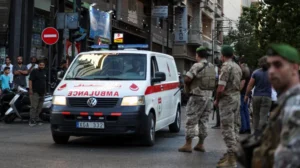Simultaneous explosions linked to Hezbollah pagers result in numerous casualties, sparking a vow of retaliation from the armed group.

The explosions struck both Lebanon and Syria, targeting Hezbollah fighters and affiliates. Among the deceased was a 10-year-old girl, as confirmed by Lebanon’s health minister, Firass Abiad. The latest figures indicate that over 2,700 people have been wounded, including Iran’s ambassador to Beirut, Mojtaba Amani. Reports also suggest that several Hezbollah fighters in Syria were injured, with some receiving treatment in Damascus hospitals. Iranian media linked to the Revolutionary Guards also reported the deaths of some of its personnel in Syria.
This attack has been described as the most significant breach of Hezbollah’s security in nearly a year of ongoing conflict with Israel. The blasts exploited low-tech pagers, a communication tool that Hezbollah adopted in recent years to reduce the risk of targeted assassinations. The devices involved in this incident were reportedly a new model.
Hezbollah quickly condemned the explosions and issued a statement placing full responsibility on Israel. The group announced that two of its fighters were among the dead and promised “just punishment” in response. In addition to these fighters, it is reported that the son of Hezbollah MP Ali Ammar, as well as the sons of other high-ranking Hezbollah officials, were also killed.
As of now, there has been no response from the Israeli military regarding the accusations. The attack comes just hours after Israel expanded its military objectives to include actions against Hezbollah, in response to escalating tensions following Hamas’s assault on Israel on October 7.
This incident also follows months of Israeli-led targeted strikes aimed at Hezbollah leaders. In response to the explosions, Lebanon’s health ministry has placed hospitals on high alert and urged citizens to distance themselves from wireless communication devices. Hezbollah operates its own secure communication network, separate from the national infrastructure.
The explosions come at a time when the United States has been working to mediate and ease tensions in the region. The U.S. government has denied prior knowledge of the attack, with State Department spokesperson Matthew Miller stating that Washington was neither involved nor informed in advance. He also noted that it was too early to assess the impact this event might have on ongoing Gaza ceasefire negotiations.
(Associated Medias) – All rights reserved
